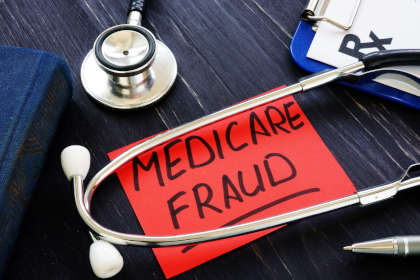Every year, billions of dollars are lost to Medicare fraud, and scammers regularly target seniors who may be less technologically savvy to steal a quick buck.. It could start with a phone call or a letter. You may get a call offering “free” medical equipment. Or you might receive a letter asking you to verify personal information. Fraud may also take the form of fake bills or charges, designed to trick you into paying a false invoice.
Your Prescriptions Sorted and Delivered
Criminals treat your Medicare number and personal information as a valuable commodity, just like a credit card. Once it’s in the wrong hands, it can be used in various ways to con seniors, doctors, or the government. The good news is that keeping yourself safe is relatively straightforward. It doesn’t take a lot of work. With a little vigilance, you can take essential steps to protect yourself from Medicare fraud.
7 Ways To Protect Yourself From Medicare Fraud
Here are 7 practical ways to stay ahead of scammers:
1. Guard Your Medicare Card Like a Credit Card
Your Medicare card is a direct line to your health and financial records, so treat it like a credit card. Don’t leave it out in the open, and don’t carry it with you regularly unless you expect to need it for a medical appointment. Keep your Medicare card stored safely at home, ideally in a fire-resistant safe or lock box, so you have quick access when needed.
Never make copies or casually hand out Medicare information. If your card goes missing, call Medicare immediately to order a replacement. Fraud and identity theft are less likely to occur if you treat your Medicare card with the same care as your bank cards.
2. Never Share Your Medicare Number Over the Phone
Fraudsters often pretend to be from Medicare, an insurance company, or a doctor’s office. They call seniors and say they need to verify or update information. In reality, Medicare will never call you out of the blue to ask for your number.
If you are asked for your number, hang up. Do not give your Medicare number to anyone except a provider you have called. Keeping your Medicare number safe prevents fraudsters from billing Medicare for medical services you didn’t get or products you didn’t order.
Remember, Medicare already knows your name, address, phone number, and Medicare number. Legitimate callers won’t ask for all of that information out of the blue.
3. Review Medicare Summary Notices for Errors
Every few months, you will get a Medicare Summary Notice (MSN) that lists the services billed to your account. Many seniors stuff these forms in a drawer and pay them little or no attention, allowing fraud to go undetected. Take a few minutes to carefully review each statement.
Look for services you did not receive, double charges, and incorrect items you didn’t order. Even small, suspicious charges could be a sign of fraud. If you see something that doesn’t look right, call your provider first to verify, then call Medicare to report it.
4. Shred Old Medical Papers and Bills

Fraudsters can use obsolete medical billing information, insurance statements, and prescription documentation to gather needed information. Throwing them away can leave your information vulnerable. Use a cross-cut shredder to destroy any documents you no longer need.
Doing so will stop thieves from using your Medicare number, dates of service, and other identifying information. Even envelopes containing your name and account numbers can be helpful to thieves. Shredding can protect your privacy and make it more difficult for your information to be misused.
Medbox: Simplify Your Prescription Routine
5. Be Cautious of “Free” Medical Equipment Offers
If you receive a call, ad, or even a knock on the door from someone who claims to offer “free” Medicare-covered braces, wheelchairs, or supplies, be suspicious. Scams like these may actually be a way for crooks to get your Medicare number and bill Medicare for supplies or equipment you don’t need and will never receive.
Real Medicare-approved equipment must be prescribed by your doctor and be accompanied by proper paperwork. Never sign up for these services over the phone. Don’t give out your Medicare card to anyone you don’t know. When you’re not sure, ask your doctor or call Medicare directly. If it seems too good to be true, it probably is.
Tip: When in doubt, quickly asking a trusted family member can help you avoid fraud before handing over your details.
6. Verify Providers Before Appointments
Scammers often take on the identity of doctors or other medical professionals over the phone or email. They may even open a fake clinic to offer their services. Before you make an appointment with a new provider, take the time to double-check their legitimacy. Call your insurance company, or search for the provider through Medicare’s provider search tool.
You can also contact your state medical board. If the provider doesn’t come up or something seems fishy, don’t proceed. Using legitimate, trusted doctors and clinics helps make sure you’re getting the care you need. It also keeps your Medicare number out of the wrong hands.
Scammers and fraudsters often use high-pressure tactics and explain that you need their help urgently. If you find yourself uncomfortable in a high-pressure situation, it’s always okay to leave and reassess.
7. Report Suspicious Charges Immediately
If you receive an unexpected bill or notice something on your Medicare Summary Notice that doesn’t look right, do not ignore it. Call your health care provider and determine if the billing was a mistake. If it still appears questionable, call to report the incident to Medicare. Criminals try to pull off their schemes on as many victims as quickly as possible, so the sooner it’s reported, the easier it is to stop.
Prompt reporting helps protect the Medicare program for everyone. Don’t think that a small charge is not significant. It may just be a small piece of a larger, active scam. You have a responsibility to report suspected fraud to keep yourself and others from being victimized.
Our Pharmacy Pre-sorts and Packages Your Pills
Conclusion
The best defense against Medicare fraud is being aware of possible schemes and staying vigilant about your health and benefits. You can stay safe by monitoring your records, asking questions, and only dealing with trustworthy pharmacies and suppliers.


